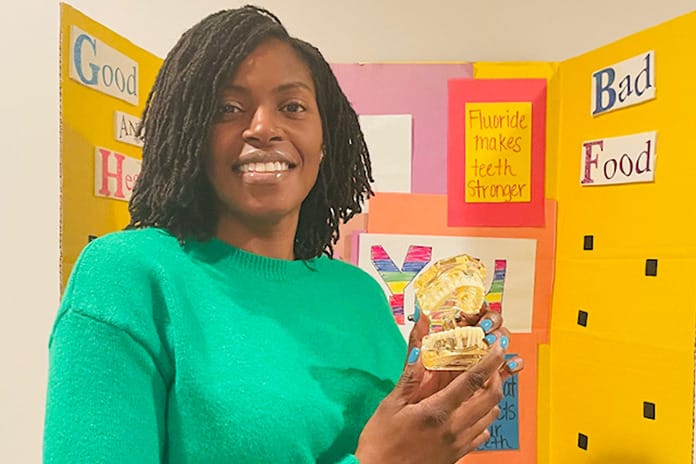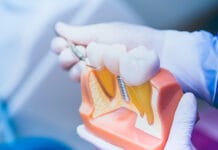Many dental hygienists may overlook multiple aspects of the profession, such as those who serve in the military. During dental hygiene school, one of our rotations was at a military base, and I found it very interesting to meet and discuss dental care in the military with the hygienist who served that base and our country.
In this article, I want to spotlight a military hygienist, Tina Prince. She served our country while also focusing on prevention strategies to ensure military members could continue to serve.
In case you have little to no experience with the military and their need to ensure members are in condition to be deployed, the military provides a readiness grade. Military members must be a grade 1 to be deployed, meaning there is little to no risk of the military member encountering oral health issues in the coming 12 months.
However, I’m an amateur here. I’ll let the expert speak on this topic.
Hatfield: Do you recall what sparked your interest in the dental hygiene profession?
Prince: I started my dental career as a dental assistant. I did not choose this career. Instead, it was chosen through what the military term an “open enlistment.” I didn’t know anything about dentistry besides my routine visits as a civilian.
After three years of assisting in specialty dentistry (endodontics, oral surgery, prosthodontics, and periodontics), I found my passion while working in periodontics. The periodontist made dentistry educational and fun. This is where my interest in becoming a dental hygienist began. While assisting in periodontal surgery, I had the opportunity to learn more about periodontal disease, including its etiology and histology.
I also saw the successful results of surgery and follow-up treatment, including periodontal scaling. Witnessing improved periodontal health and function heightened my interest in becoming a hygienist. I am grateful to the periodontist who took the time to guide me to a profession I am passionate about and enjoy to this day.
Hatfield: Can you tell me more about becoming a hygienist in the military, your responsibilities, and your successes?
Prince: The Air Force has a competitive Dental Health Profession Scholarship program. The Dental Hygiene Training Scholarship Program is an internal program for dental assistants who have already enlisted in the air force. There are also opportunities for civilians who are interested in becoming dentists or other allied health specialists to gain financial and scholarship help from the Air Force.
When I applied, I was accepted alongside 10 other aspiring hygienists to attend one of two dental hygiene schools that partner with the Air Force, one in South Carolina and the other in Florida. I was honored to be selected and begin my hygiene career upon graduation and licensure. I spent most of my career as a hygienist, educator, director of the base preventive dentistry program, and dental clinic flight chief. As dental clinic flight chief, I oversaw dental operations.
My primary responsibilities throughout my time changed. However, I had the opportunity to spearhead the preventive dentistry program, where I served as the expert on all matters of dental hygiene careers. This position involved a substantial community-based program involving oral health education, such as tobacco cessation programs and counseling, OB/GYN maternal education, water fluoridation monitoring, and school-based dental programs aimed at reducing dental caries.
Our most significant initiative was National Dental Health Month which, as a group and over the years, educated over 3,000 school-aged youth. It was a great joy to dress up and educate children on nutrition and proper oral hygiene care.
In addition, each month, I was responsible for monitoring and correcting trends related to high caries to prevent incidents that may prevent military members from being mission ready. We monitored caries levels and promoted fluoride and sealants to members at risk for caries development.
In the Air Force, we are called Airmen. Things that would prevent Airmen from being mission-ready would be anything that would cause them dental pain in deployed environments. The goal is to keep Airmen free of dental pain with an extremely low probability of requiring urgent dental treatment, including root canals, extractions, active orthodontic treatment, or caries. Airmen must have yearly visits, similar to routine check-ups (exams, radiographs, periodontal charting, and hygiene treatment). If they are deploying, they are examined before leaving to ensure dental readiness.
As the dental flight chief of 64 personnel, I monitored clinic operations, including overseeing all dental specialties, training, and education of staff members, training over 20 technicians, scheduling, and overall organization and management of the clinical aspect of the dental facility. The most challenging part of this particular position was preparing for Health Services Inspections. This inspection is similar to hygiene programs and dental schools and what they undergo to maintain accreditation. As a unit, I will mention that we received an “Outstanding” rating each time.
There are many aspects to dentistry, and it is rewarding to explore all that is offered! My most memorable experience was being able to participate, coordinate, and help sponsor retiree appreciation day. During this time frame, we provided dental treatment ‒ both preventive and restorative ‒ to those who served. It was great to offer dental services to this population and show our appreciation.
Hatfield: Do you know the statistics of the number of military members you helped and what preventive and therapeutic treatments you provided?
Prince: It is difficult to pinpoint the exact number of military members throughout my tenure. It certainly was numerous. During my last three years before retirement, I managed and directed squadron operations in support of treating 7,000 active-duty personnel, roughly generating 5.1 million dollars in productivity, as an estimation.
I solely performed over 4,500 procedures. These procedures included periodontal and preventive treatment such as prophylaxis, nutritional counseling, sealants, and fluoride.
Hatfield: Since your retirement from the military, what have you been doing in dental hygiene?
Prince: I work in the clinic less these days as a part-time hygienist. This transition allows me to connect and continue educating patients while pursuing other aspects of dentistry. I am still a big advocate for children and prevention. I continually visit schools and provide oral health instruction and education. I am actively involved in my church and community’s local health fairs.
I also briefly taught dental hygiene students, but I am currently a professional educator for a dental manufacturer. I would classify myself as a community servant, and my passion is always to help others where I am skilled and knowledgeable. My future goal is to become a CE provider as a way of continuing as an educator.
Hatfield: What changes would you like to see in the dental hygiene profession?
Prince: More opportunities! The practice of dental hygiene is constantly evolving. Yet, many of my colleagues are either burned out from clinical practice and may not necessarily want to pursue sales or be an educator. Also, sales and educator opportunities are limited.
I know many who have left the profession due to these reasons. It would be great to partner more with public health, opening whitening businesses for the licensed hygienist, more teledentistry opportunities, research opportunities, increased opportunities for dental hygiene practitioners, and better uniformity among the states! It is challenging when colleagues can perform procedures due to being in particular states, whereas others are so regulated.
We must continue to grow and evolve the dental hygiene profession. Dental hygienists are much more than scalers, and great hygienists are doing amazing things. I am thankful for those leading the way and who have mentored me knowingly and unknowingly.
Tina is such an asset to our profession. I’m grateful she was willing to be interviewed and highlight aspects of dental hygiene that are often forgotten. Tina, thank you for your service. Not only to this country but to the thousands of people you have served by providing dental care and education.
Before you leave, check out the Today’s RDH self-study CE courses. All courses are peer-reviewed and non-sponsored to focus solely on high-quality education. Click here now.












